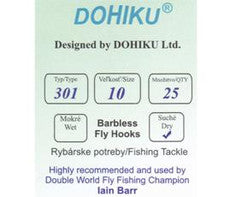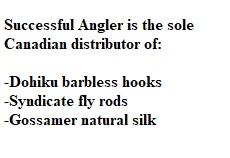
I have been fishing for over 40 years and fly-fishing for over 30.
My first fly-fishing competition took place in 1988 and soon after that I qualified to compete at the 1992 World Fly Fishing Championship in Italy.
Fish species caught on the fly:
-freshwater: brown trout, European grayling, rainbow trout, brook/speckled trout, marble trout, perch, chub, barbel, pike, bass, whitefish. Countries: Romania, Italy, Canada, Slovakia, Czech Republic, Poland, Sweden, Scotland, USA, Australia (Tasmania), New Zealand.
-saltwater: bonefish, tarpon, barracuda, red snapper, red fish (red drum), black drum, flounder, seatrout, sheepshead, striped bass. Countries: Cuba, USA (Gulf of Mexico), Canada
Starting from 2010 I have used Dohiku barbless hooks extensively. They performed better than all the other hooks I tried before so I decided to make them available to fly-anglers.
Several times World Champions Team France have been using Dohiku!
Dohiku hooks are designed in Slovakia by fly-fishing competitors and manufactured in Japan under strict quality control.
I am the Canadian distributor for these hooks and highly recommend them to all fly-fishers who want to improve their hook-up and fish landing ratio. Most Dohiku hooks have a bent in point which significantly improves the fish holding ability.
Since one would rarely use bare hooks for fly-fishing I decided to continuously increase the list of materials. Come back often to see the latest additions!
|
|
Experience and Accomplishments Competitions:
International Level Awards:
National Level Awards:
Completed these courses and clinics:
|
Considerations when choosing a barbless hook:
- Some 20 years ago the largest hook manufacturer in the world (Mustad) paid for a world wide survey and the #1 feature anglers look for when choosing a hook is sharpness. The hook may be strong, have the best shape, and be low or high priced. All other characteristics are irrelevant if at the very first contact with the fish the hook is not sharp enough to set into the fish.
- Strength and wire thickness: bear in mind that for nymph fishing the tippet used is usually 6X (0.12mm) or at the most 5X (0.15mm) which only holds a few pounds. Some even push the limits using 7X or 8X. So why would some hook manufacturers use heavy wire? The answer is simple: because they are not able to make a strong hook with a finer wire. The outcome is that some competition fly anglers are using dry fly hooks for nymphs so the smaller fish will not bounce off during hook setup. Unfortunately when trying to land a sizable fish the dry fly hook may not hold. You do have a better option: use Dohiku hooks. They are made in Japan using the best steel and the right wire diameter for each hook size. This way the smaller fish do not bounce off and the big ones will not open up the hook and get away!
- Material and thermal treatment: this is where most manufacturers fail. The steel is either too soft and the hook opens easily, or the steel is too stiff - to the point where it is brittle. I encourage you to try and change the shape of the hook. If it either breaks or opens up too easily you have your answer.
Tight lines,
Sorin













